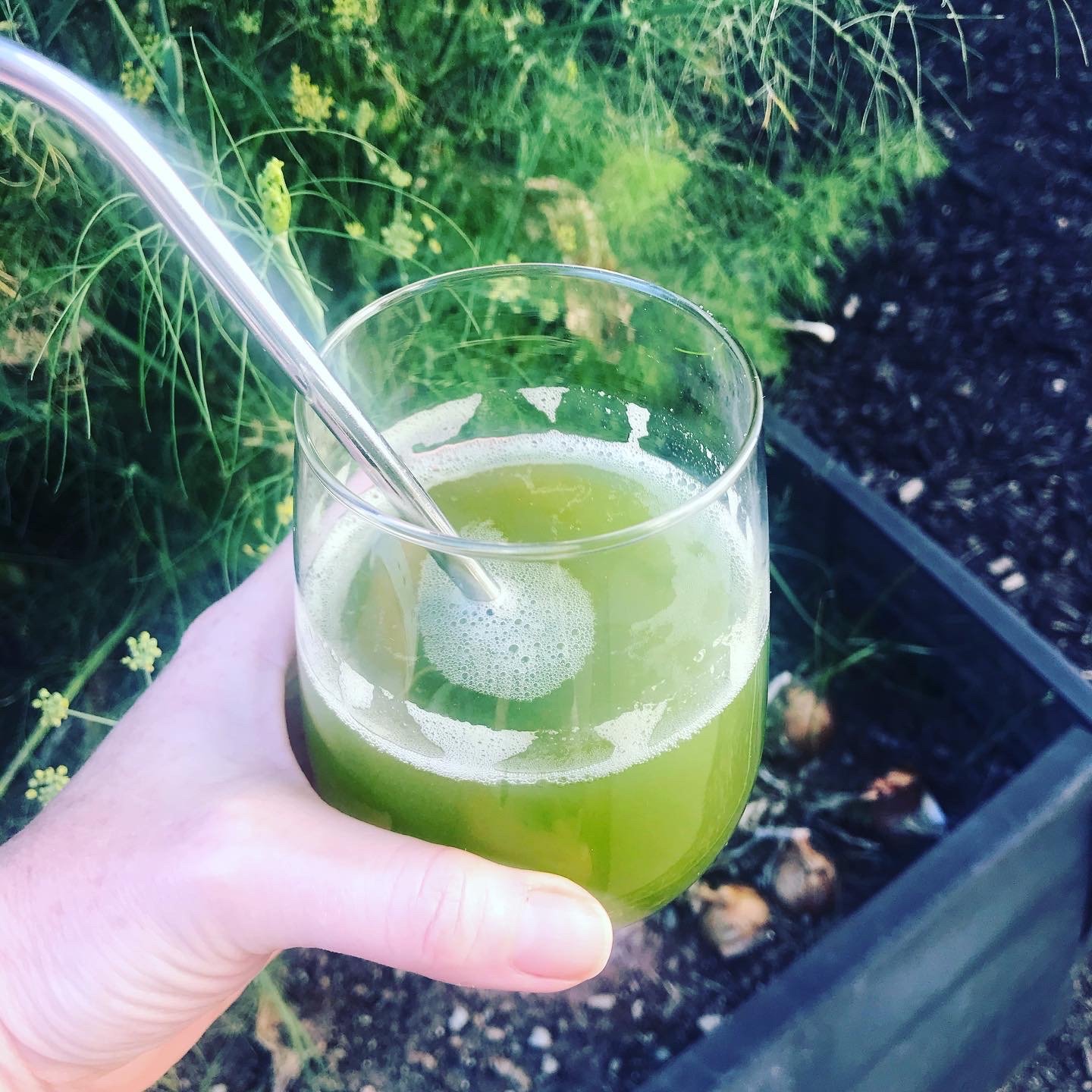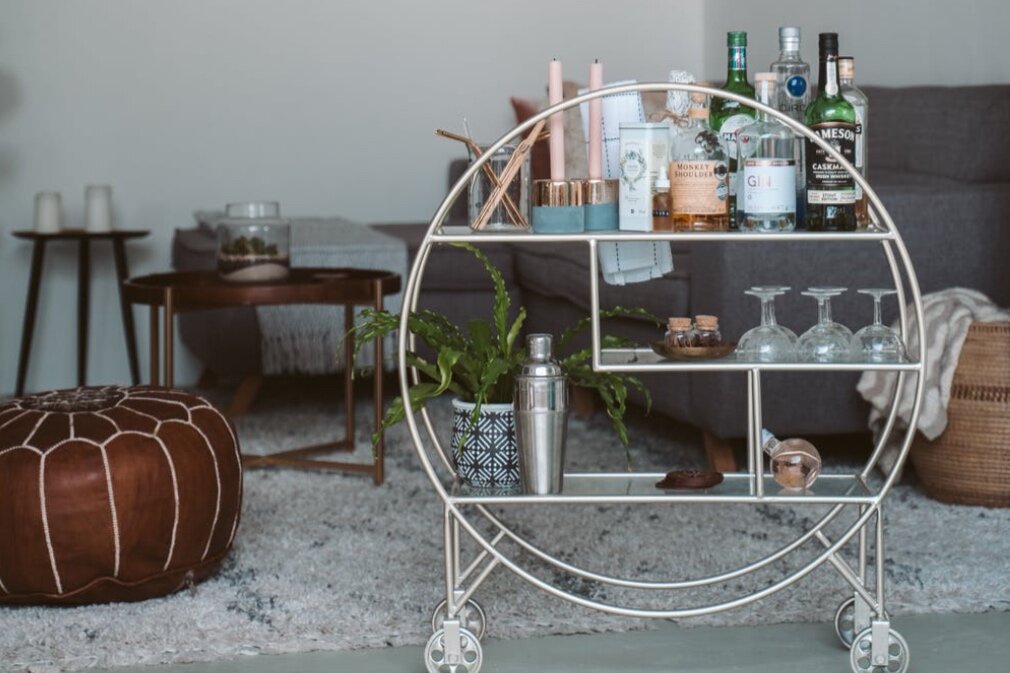
BLOG: NEWS, RECIPES AND ARTICLES
Tips for Dry January Success
If you are taking a month off from drinking alcohol, you are not alone. Going “dry” for the month of January is on trend. “Dry January” has become a robust movement that started in 2012 from a public health initiative in the UK. Now millions of people around the globe are expected to abstain from alcohol this month.
Wondering if this is for you?
If you are taking a month off from drinking alcohol, you are not alone. Going “dry” for the month of January is on trend. “Dry January” has become a robust movement that started in 2012 from a public health initiative in the UK. Now millions of people around the globe are expected to abstain from alcohol this month.
Wondering if this is for you? The research shows that pushing the reset button on drinking after the holidays can benefit everyone, not just heavy drinkers. All types of drinking patterns, from light (1-6 drinks per week) to heavy (3 or more drinks in one day or more than 7 per week for women; more than 4 drinks in one day or more than 14 per week for men), report short-term improvements in deeper sleep, better food choices, improved lab markers, and even weight loss.
Why do Dry January?
Everyone can benefit from reevaluating their relationship with alcohol. Being alcohol-free for 31 days reminded us that we don’t need alcohol to have fun, relax, or socialize. Additionally, we strengthen our skills needed to manage our drinking. That means that for the rest of the year we are better able to make decisions about when we drink and how much, so we can avoid slipping into drinking more than we really want. In fact, a University of Sussex study showed that 70% of people who took part in Dry January were still drinking less six months later, especially if they use the Try Dry app developed by Alcohol Change UK. Other short term perks like better sleep, more energy, healthier skin, and sharper concentration seem to persist past the 31-day dry challenge too. And, even those who fell short of abstaining the entire month were drinking less after 6 months.
In another study from the UK, researchers confirmed the old adage that avoiding alcohol gives our liver a break. The participants of the study saw improved liver enzymes even when they kept their eating, smoking, and/or exercise habits the same. The study participants also enjoyed reductions in weight, blood pressure, insulin resistance, and cancer-related growth factors.
Dry January Benefits:
What you'll notice Quickly(1):
70% of people sleep better
86% of people save money
65% of people notice generally improved health
Short-term medical benefits(2):
Reduced diabetes risk
Improve blood pressure (BP)
Lower cholesterol
Reduced level of cancer-related proteins in the blood
Improved liver function tests
Long-term benefits:
Alcohol is linked with more than 60 health conditions including liver disease, high blood pressure, depression and seven types of cancer. Cutting back on alcohol long-term reduces your risk of developing these conditions.
Tips to improve your success completing a 31-day alcohol free challenge:
Fennel Shrub Mocktail (Click here for the recipe.)
Find a substitute non-alcoholic drink. For social situations, or when you crave a cocktail after a long day, reach for alcohol-free beverages like sparkling water, kombucha, or virgin beverages (non-alcoholic versions of alcoholic drinks.) There are many new and delicious non-alcoholic options on the market these days. I personally like to make a mocktails by combining sparkling water (love my soda stream) with a splash of bitters and an herb or citrus garnish. Experiment with a variety of bitters for fun flavors and combinations.
Non-alcoholic beer or wine is also an option, but some brands still contain up to 0.5% alcohol by volume, so check the label. Sugar is often added to these beverages to improve the taste, so try to choose ones that are low in sugar.
“Shrubs” also make excellent alternative to alcohol. Shrubs are sweetened vinegar based syrups that can be mixed with sparkling water. They can be fruity, spicy or herbaceous with a kick from the vinegar. I like to use apple cider vinegar because it has health benefits on its own.
Avoid temptations. Keep alcohol out of your house. When you are invited to someone’s home, bring your favorite non-alcoholic drinks with you to share.
Create a support group. Let friends and family know about your intentions and encourage them to keep you accountable. Better yet, enlist someone to do the challenge with you.
Use the Try Dry app. This free app is sponsored by the non-profit Alcohol Change UK. It helps you track your drinking, set personal goals, and offers motivational information like calories and money saved from not drinking. It’s aimed at cutting back on or cutting out alcohol, depending on your choices. Use of the app has been shown to double your success of completing a dry month challenge.
Don’t give up. If you slip up, don't feel guilty. Tomorrow is a fresh start.
Warning:
Stopping drinking suddenly can be very dangerous, and can even kill you, if you are dependent on alcohol. If, after a period of drinking, you experience any of the following symptoms, you may be dependent on alcohol and you should NOT suddenly stop drinking completely: seizures, hand tremors, sweating, visual hallucinations, depression, anxiety or insomnia. You can still take control of your drinking. Speak to your health care provider to get help for you to reduce your drinking safely.
References:
1. Alcohol Change UK. Accessed 1/7/2022.
2. Mehta G, et al. BMJ Open 2018;8:e020673. doi:10.1136/bmjopen-2017-020673
3. Thinking of trying Dry January? Steps for success. Harvard Health Publisher. Accessed 1/7/2022.
HOW ABOUT A “QUARANTINI?”
FIRE CIDER MOCKTAIL RECIPE
ELDERBERRY SHRUB MOCKTAIL RECIPE
How about a “Quarantini?”
Daily life in the times of COVID-19 requires extra attention to our coping skills. Unwinding with a glass of wine or a "quarantini" has become a new norm for many people.
I recently came across two news reports that put in perspective the significance of this new coping habit. One article detailed the increased sales and consumption of alcohol this spring during the COVID-19 lockdown, while the other discussed the upcoming revised (and lowered) guidelines for safe alcohol consumption. Just as Americans are drinking more, research suggests we should be drinking less.
Daily life in the times of COVID-19 requires extra attention to our coping skills. Unwinding with a glass of wine or a "quarantini" has become a new norm for many people.
I recently came across two news reports that put in perspective the significance of this new coping habit. One article detailed the increased sales and consumption of alcohol this spring during the COVID-19 lockdown, while the other discussed the upcoming revised (and lowered) guidelines for safe alcohol consumption. Just as Americans are drinking more, research suggests we should be drinking less.
How much is too much?
For many years, the US Dietary guidelines implied there was evidence that moderate drinking could lower the risk of heart disease and reduce mortality. With that in mind, the US Dietary Guidelines 2015-2020 states that if alcohol is consumed, it should be in moderation—up to one drink per day for women and up to two drinks per day for men. High risk drinking is the consumption of 4 or more drinks on any day or 8 or more drinks per week for women and 5 or more drinks on any day or 15 or more drinks per week for men. With these guidelines, a daily “quarantini” may be classified as high-risk drinking.
Presently, a committee of scientists updating the latest edition of the Dietary Guidelines for Americans is changing the current stance on alcohol. After careful evaluation of the research, they report that studies showing alcohol can protect health are deeply flawed, and that any potential cardiovascular benefits would be outweighed by the fact that alcohol is a leading preventable cause of cancer. The committee plans to recommend that men and women who drink limit themselves to a single serving of wine, beer or liquor per day. They do not recommend drinking for health and suggest drinking less is generally better.
What are the risks of drinking?
While our nerves may be soothed in the short term, regular alcohol consumption may be counterproductive to our overall health and wellbeing. Many people are aware that excessive drinking can increase the risk for liver disease and obesity, but may not realize that even moderate alcohol consumption (one drink a day) can increase the risk of breast cancer, depression and a wide range of cardiovascular problems, including high blood pressure. Alcohol compromises our sleep quality which can translate into irritability, brain fog and a weakened immune systems. The more you drink, the higher your risk.
Finding alternatives to the “quarintini”
An occasional alcoholic beverage can be part of a healthy lifestyle, but now is a good time to evaluate your current drinking pattern. When do you typically drink and how often? Do you drink to unwind? Could you go a month without a drink? These questions may give insight into your relationship with alcohol.
If you find you are reaching for alcohol to help you unwinding in the evening, consider some of these alcohol-free strategies for coping with pandemic stress.
Practice regular self-care. Staying physically active, getting plenty of sleep and eating healthy foods are three of the most important tactics to prioritize.
Find a mindfulness practice you enjoy and will complete. Yoga, meditation and deep breathing techniques are well documented to help ease stress. Headspace and Calm are great apps for guided meditation. “Tapping” or emotional freedom technique is a form of phycological acupressure that can also give dramatic results. Check out “The Tapping Solution” app to get started.
Replace alcohol with alternative beverages you enjoy. Plenty of filtered water during the day is helpful, but consider mocktails, kombucha or green juices. I’ve been enjoying this refreshing fennel scrub lately.
Replete your nutrients. If you are drinking regularly you may have a micronutrient deficiency. Regular alcohol consumption can trigger low levels of magnesium, zinc , and glutathione. Correcting these deficiencies, especially in the case of magnesium, may support your mood and promote relaxation. I recommend talking with a health care provider to customize a supplement plan to meet your needs.
If you find yourself drinking excessively on a regular basis, seek professional help in person or via phone or video chat. The Substance Abuse and Mental Health Services Administration's Disaster Distress Helpline is available at 800-985-5990. For those in recovery, Alcoholics Anonymous provides a listing of online meetings at aa-intergroup.org.
How did you sleep last night?
Research is showing that sleep is not only important to our energy level and mood but is also closely tied to our longevity. If sleep eluded you last night, try some of these tips for better rest tonight and in the future.
Yesterday was World Sleep Day. Research is showing that sleep is not only important to our energy level and mood but is also closely tied to our longevity. If sleep eluded you last night, try some of these tips for better rest tonight and in the future:
Cut back on caffeine. Response to caffeine varies person to person, but this drug remains in your system far longer than most people realize. The half-life of caffeine is several hours. This means that your morning coffee is still hanging around at lunchtime, and you may still have a quarter of the caffiene in your system at dinnertime.
Move during the day. People who exercise regularly report more satisfying sleep. Be sure to finish your workout at least three hours before bed to make sure you have proper time to relax and cool down.
Make your room dark. Light can disrupt our body’s natural secretion of melatonin. Making your room dark and avoiding blue light that is emitted from electronic devices before bedtime can help ensure our body maintains its natural circadian rhythm. If you needs some help blocking blue light, try blue light filtering glasses.
Avoid alcohol within three hours of bedtime. While alcohol can make you sleepy, it alters the brainwave activity in your brain, preventing restorative sleep.
Relax before bed. Create an evening routine that puts you in a relaxed frame of mind. Try reading a neutral book, journaling or taking a hot bath. A hot bath with Epsom salts relaxes muscles and reduces tension through the help of magnesium sulfate.
If sleep continues to be a concern let’s talk. Addressing hormones, blood sugar balance and stress management are also important for proper sleep.
Schedule an appointment with Relish Health today.
Improve Your Sleep, Improve Your Health
Sleep is vital to the maintenance and healing of your body each day; and the lack of sleep is linked to a variety of serious health problems, including heart attack, stroke, type-2 diabetes, hormone balance, obesity and even wrinkles. While the amount of necessary sleep differs from person to person, most people need between 7-9 hours each night.
At Relish Health we discuss many lifestyle solutions that can improve your night’s rest, including dietary and nutritional choices listed below. Your body is unique and will respond to different foods and activities depending on a variety of factors. See me to develop a customized plan for improving your sleep and your overall health.
Sleep is vital to the maintenance and healing of your body each day; and the lack of sleep is linked to a variety of serious health problems, including heart attack, stroke, type-2 diabetes, hormone balance, obesity and even wrinkles. While the amount of necessary sleep differs from person to person, most people need between 7-9 hours each night.
At Relish Health we discuss many lifestyle solutions that can improve your night’s rest, including dietary and nutritional choices listed below. Your body is unique and will respond to different foods and activities depending on a variety of factors. See me to develop a customized plan for improving your sleep and your overall health.
Maintain a steady blood sugar level. Eating a balanced diet that is rich in fruits, vegetables, “good” fats and lean proteins and avoids added sugar is important for maintaining steady blood sugar levels. Erratic levels can lead to elevated stress hormones that disrupt the sleep process. When eating a bedtime snack be sure to pair carbohydrates with a source of fat or protein to help promote steady absorption of the nutrients. For example, pair almond butter with your banana to make a balanced snack.
Enjoy alcohol wisely. Although alcohol can cause drowsiness, it delays the brain from entering the REM sleep cycle, which is restorative to its function. Consuming alcohol within 3 hours of bedtime may cause you to wake up still feeling tired despite having spent an adequate amount of time in bed. Having a drink at dinner is unlikely to disturb your sleep, but consider switching to tea for a night cap. Herbal teas that are known to promote relaxation include chamomile, holy basil or lemon balm.
Minimize caffeine consumption. Caffeine is a powerful stimulant. It has a 6-hour half-life, which means you still have 50% of your morning caffeine in your body at lunch and still 25% at dinner time. Anything you drink after noon will still be near 50% strength at bedtime.
Consume foods that promote melatonin production. Melatonin is a hormone produced in the pineal gland of the brain. It helps regulate our sleep-wake cycle as well as helps orchestrate other hormonal functions. Certain foods have been associated with boosting the body’s ability to produce this important hormone and minimize the need for supplementation. Consider adding these foods to your evening meal: pineapple, cherries, bananas, oranges, oats, sweet corn, and rice.
Consume foods rich in vitamins and minerals. Key nutrients including magnesium, zinc, vitamin D and B vitamins support relaxations, healing and neurotransmitter manufacturing. Nutrients dense foods include dark leafy greens, nuts, seeds, fish, beans, whole grains, avocados, yogurt, bananas, dried fruit and dark chocolate.





